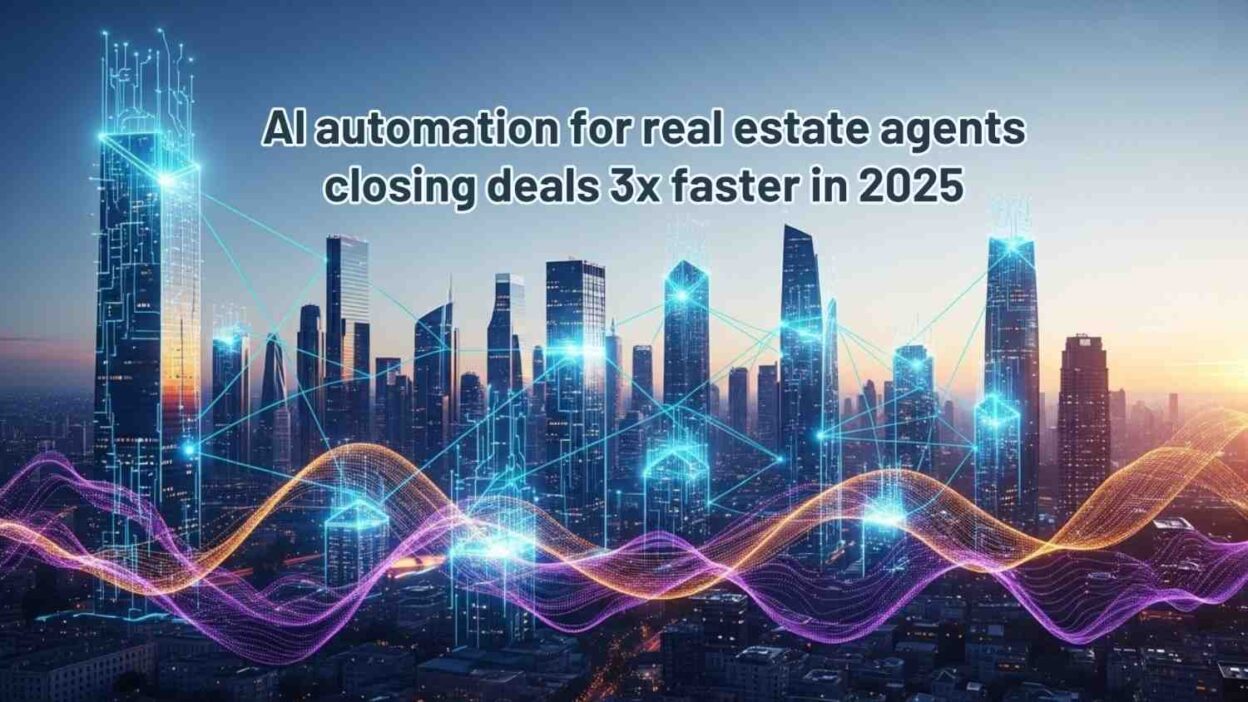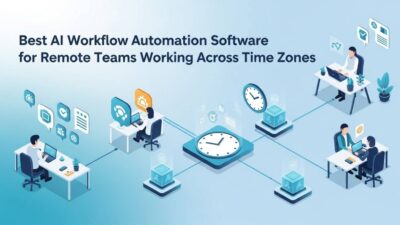Introduction
TL;DR Real estate agents face relentless demands on their time and attention. You juggle property showings, client calls, paperwork, marketing, and follow-ups simultaneously. Days blur into nights responding to inquiries and coordinating schedules. Many qualified leads slip through the cracks while you’re handling urgent matters.
Top-performing agents close deals faster than their competitors. Speed matters enormously in hot real estate markets. Buyers expect immediate responses to property questions. Sellers want constant updates on marketing efforts. The agent who responds first often wins the listing or closes the sale.
AI automation for real estate agents closing deals faster transforms how you operate your business. Intelligent systems handle repetitive tasks automatically. Lead qualification happens instantly without your involvement. Property marketing runs on autopilot across multiple platforms. Your calendar fills with high-value activities instead of administrative busywork.
Traditional real estate operations waste countless hours on low-value tasks. You manually enter client information into your CRM. Email follow-ups require drafting similar messages repeatedly. Scheduling showings involves endless back-and-forth communication. These activities consume time better spent building relationships and negotiating deals.
Technology now eliminates these bottlenecks completely. AI-powered tools qualify leads while you sleep. Automated marketing systems nurture prospects through sophisticated campaigns. Smart scheduling coordinates showings without your constant attention. Your pipeline flows smoothly from lead to closing.
This comprehensive guide reveals exactly how AI automation for real estate agents closing deals faster works in 2025. You’ll discover specific tools transforming real estate businesses. You’ll learn implementation strategies that deliver immediate results. Your competition already uses these technologies. Time to catch up and surpass them.
Table of Contents
Understanding Why Real Estate Agents Struggle With Deal Velocity
Deal velocity determines your income and business growth. Identifying obstacles helps you select appropriate automation solutions.
Lead response time creates competitive disadvantages. Buyers contact multiple agents about properties they like. The agent responding within five minutes dramatically increases their chance of winning that client. Manual lead handling introduces delays that cost you business.
Qualification bottlenecks waste time on unqualified prospects. You spend hours with buyers who can’t afford properties they want. Sellers without realistic price expectations consume meeting after meeting. Proper qualification upfront saves enormous amounts of time later.
Property marketing requires constant attention and creativity. Listing photos need editing and uploading to multiple platforms. Social media posts demand regular creation and scheduling. Email campaigns require writing and segmentation. Marketing overwhelms agents who should focus on client relationships.
Showing coordination involves tedious scheduling logistics. You call clients to propose times. They call back with conflicts. You contact sellers about access. The property becomes unavailable at the agreed time. This coordination dance repeats for every showing.
Document management creates administrative nightmares. Purchase agreements contain dozens of required forms. Missing signatures delay closings unnecessarily. Version control becomes impossible with email attachments flying everywhere. Paperwork buries agents who should be out selling.
Follow-up consistency separates top performers from average agents. Consistent touchpoints keep you top-of-mind with prospects. Manual follow-up requires discipline and memory. People fall through the cracks during busy periods. Inconsistency costs you deals that competitors capture.
Client communication expectations have increased dramatically. Buyers want immediate answers to property questions. Sellers expect daily updates during listing periods. Phone calls, texts, emails, and social messages require constant monitoring. Communication demands exceed what any human can handle alone.
How AI Automation Specifically Accelerates Real Estate Deal Cycles
AI automation for real estate agents closing deals faster addresses each bottleneck systematically. Modern technology redesigns real estate operations around speed and efficiency.
Instant lead response systems engage prospects immediately. AI chatbots answer property questions 24/7 without your involvement. Initial conversations happen while you sleep or show other properties. Qualified leads flow into your CRM automatically with complete conversation history.
Intelligent qualification assessments filter prospects automatically. AI asks buyers about budgets, timelines, and preferences systematically. Credit pre-qualification status gets verified through automated checks. You receive only leads meeting your specific qualification criteria.
Automated property marketing launches across all channels simultaneously. Systems generate property descriptions using AI writing tools. Photos upload and distribute to MLS, Zillow, Realtor.com, and social media automatically. Email campaigns send to segmented prospect lists without manual work.
Smart scheduling coordinates showings without phone tag. Clients book appointments through automated calendar links. Sellers receive automatic showing requests. Confirmation reminders reduce no-shows dramatically. Your calendar fills with qualified appointments automatically.
Document automation generates purchase agreements from templates. Required forms populate with property and client information automatically. E-signature platforms collect signatures without printing or scanning. Transaction coordinators receive completed documents automatically for processing.
Systematic follow-up sequences nurture leads consistently. Drip campaigns send personalized emails based on prospect behavior. Text message reminders keep you top-of-mind appropriately. No lead gets forgotten regardless of how busy you become.
Client communication management centralizes all conversations. Unified inboxes aggregate texts, emails, and social messages. AI suggests responses based on message content. Communication history attaches to client records automatically. You never lose track of important conversations.
Essential AI Tools for Lead Generation and Qualification
Lead generation determines your pipeline health and future income. AI automation for real estate agents closing deals faster starts with capturing and qualifying prospects efficiently.
Zillow Premier Agent provides leads directly from property searches. Buyers actively looking at listings receive your contact information. AI algorithms match your listings with interested prospects. Integration with CRM systems transfers lead data automatically. Costs vary based on zip code competition levels.
Offrs uses predictive analytics to identify likely sellers. The platform analyzes property and owner data to predict selling probability. You receive homeowner contact information for outreach. This proactive approach finds listings before competitors know about them. Pricing includes monthly subscription plus cost per lead.
BoldLeads offers Facebook advertising automation with lead capture. The system creates and manages Facebook ad campaigns automatically. Landing pages capture prospect information and qualify interest level. Lead nurturing happens through automated email sequences. Pricing starts around $349 monthly plus advertising budget.
SmartZip identifies homeowners likely to sell within specific timeframes. Predictive analytics analyze hundreds of data points per property. Direct mail campaigns target high-probability sellers automatically. Email marketing reinforces direct mail with coordinated messaging. Monthly fees depend on geographic area and volume.
Zurple employs conversational AI for website lead engagement. Chatbots interact with website visitors in natural conversations. Prospect behavior triggers personalized email follow-up automatically. Machine learning improves responses based on successful conversations. Pricing includes setup fees and monthly subscriptions.
Sierra Interactive provides complete website and CRM solutions. Lead capture tools integrate across your digital presence. Automated valuation tools engage homeowners considering selling. Drip campaigns nurture leads through sophisticated sequencing. Custom pricing reflects features and lead volume needs.
Structurely uses AI sales assistants for lead qualification. Virtual assistants conduct text message conversations with prospects. Qualification questions determine buying or selling readiness. Appointments schedule automatically for qualified leads meeting your criteria. Pricing depends on conversation volume and features selected.
Automating Property Marketing Across Multiple Platforms
Property marketing reaches potential buyers through multiple channels. Automation ensures consistent, professional marketing without consuming all your time.
Virtual staging transforms empty properties digitally. Companies like BoxBrownie and VirtualStagingSolutions add furniture to listing photos. AI analyzes rooms and places appropriate furniture styles automatically. Cost runs $24-39 per photo with 24-48 hour turnaround. Staged properties sell faster and for higher prices consistently.
Automated MLS syndication distributes listings everywhere buyers search. Systems like ListHub push your listings to hundreds of websites. Updates and price changes propagate automatically across all platforms. This syndication happens immediately after MLS entry. Broad exposure accelerates buyer interest and offers.
Social media scheduling tools post property listings consistently. Buffer, Hootsuite, and Sprout Social automate social posting. You create content once and schedule across Facebook, Instagram, and Twitter. AI suggests optimal posting times based on audience engagement patterns. Your social presence remains active without daily manual posting.
Email marketing automation sends listings to segmented audiences. Mailchimp and ActiveCampaign target buyers based on preferences. New listings matching saved searches trigger automatic emails. Open and click tracking reveals genuine interest levels. Follow-up sequences engage prospects showing interest automatically.
Video creation tools generate property tour videos automatically. Platforms like Animoto and Lumen5 create videos from photos. AI adds music, transitions, and text overlays professionally. YouTube and social media video posts happen automatically. Video marketing reaches buyers who prefer visual content.
Property websites build automatically for premium listings. Systems like Luxury Presence create single-property websites. Custom domain names enhance prestige property marketing. SEO optimization helps buyers find properties through search. These websites generate in hours rather than days of manual work.
Retargeting campaigns follow interested prospects automatically. Facebook and Google Ads pixel tracking identifies website visitors. Automated ads display your listings to people who viewed them previously. This persistent presence keeps properties top-of-mind. Retargeting converts browsers into buyers more effectively.
AI-Powered CRM Systems That Accelerate Deal Closure
Customer relationship management determines how efficiently you move prospects toward closings. Modern AI-powered CRMs transform relationship management completely.
Follow Up Boss specializes in real estate agent needs specifically. The system routes leads to appropriate team members automatically. Text messaging integrates natively for quick communication. Action plans guide agents through optimal follow-up sequences. Pricing starts at $69 per user monthly.
LionDesk combines CRM with video messaging capabilities. Automated drip campaigns nurture leads through personalized sequences. Video emails create stronger personal connections than text alone. Transaction management tracks deals through closing stages. Plans begin at $25 monthly per user.
Wise Agent offers comprehensive contact and transaction management. Lead distribution rules assign prospects based on custom criteria. Automated birthday and anniversary messages maintain relationships. Document storage keeps transaction files organized centrally. Subscription costs $29 monthly per agent.
kvCORE provides enterprise-level features for teams and brokerages. Behavioral automation triggers actions based on prospect activity. Smart CRM learns from agent interactions and suggests next steps. IDX website integration captures leads directly into the system. Pricing varies based on team size and features.
Top Producer focuses on contact management and marketing automation. The platform includes done-for-you marketing campaigns. Lead nurturing happens through pre-built email sequences. Mobile apps keep you connected to your database anywhere. Costs approximately $40 monthly depending on plan.
Contactually uses AI to prioritize relationship management. The system analyzes your database and recommends who to contact. Automated follow-up buckets organize contacts by engagement level. Email templates speed up personalized communication. Pricing starts around $69 monthly per user.
RealtyJuggler serves budget-conscious individual agents effectively. Basic CRM functionality tracks contacts and transactions. Automated follow-up reminders prevent leads from going cold. Simple interface requires minimal learning curve. Annual subscription costs just $149 yearly.
Smart Scheduling and Showing Coordination Automation
Showing coordination consumes hours that AI automation for real estate agents closing deals faster reclaims through intelligent scheduling.
Calendly eliminates back-and-forth scheduling communications. You share a booking link with clients and prospects. They see your availability and select convenient times. Calendar integration prevents double-booking automatically. Reminder emails reduce no-shows significantly. Free plans cover basic needs with paid options starting at $10 monthly.
ShowingTime coordinates property showings for listing agents. Buyer agents request showing appointments through the platform. Sellers receive showing notifications and instructions automatically. Feedback collection happens systematically after each showing. Lockbox integration enables secure property access. Pricing includes monthly subscription per office.
Homebot provides automated client engagement through property insights. The platform sends homeowners monthly reports about their property values. Market updates keep past clients engaged long-term. Automated content maintains relationships that generate referrals and repeat business. Pricing depends on database size and features.
Doodle simplifies group scheduling for complex coordination. Multiple participants vote on preferred meeting times. The system identifies times working for everyone automatically. This tool works well for coordinating closings with many parties. Basic features remain free with premium options available.
Acuity Scheduling offers advanced appointment booking capabilities. Custom intake forms collect necessary information before appointments. Payment collection happens during booking for consultation fees. SMS reminders reduce no-show rates dramatically. Plans start at $16 monthly per calendar.
SetMore provides free scheduling with premium upgrade options. Customizable booking pages match your branding. Social media integration enables booking through Facebook. Staff scheduling coordinates team member availability automatically. Free forever plans include substantial functionality.
Appointlet specializes in meeting scheduling for sales professionals. The platform books appointments across multiple calendar types. Custom notifications keep all parties informed appropriately. Integration with CRM systems maintains contact records automatically. Pricing begins at $8 monthly per user.
Document Automation and Transaction Management Solutions
Real estate paperwork buries agents in administrative tasks. Automation handles documentation efficiently and accurately.
Dotloop revolutionizes real estate transaction management completely. The platform stores all transaction documents in organized loops. E-signature functionality collects signatures from all parties. Template libraries provide state-specific forms instantly. Real-time collaboration keeps everyone synchronized. Pricing starts around $29 monthly per user.
DocuSign dominates electronic signature market with robust features. Documents route to signers in specified sequences automatically. Mobile signing enables signatures from anywhere instantly. Audit trails provide complete signing history for compliance. Plans begin at $10 monthly per user for individuals.
Paperless Pipeline organizes transactions through visual pipeline management. Checklists ensure no steps get missed during transactions. Document storage keeps files associated with proper deals. Reporting reveals bottlenecks in your transaction process. Pricing depends on user count and features selected.
SkySlope specializes in real estate compliance and transaction management. Forms libraries include current versions for all states. Broker review workflows ensure compliance before submission. Digital signatures integrate throughout the platform. Pricing varies based on brokerage size and needs.
zipForm Plus provides access to standard real estate forms. Form completion uses intelligent field population. Changes automatically update throughout multi-page documents. Integration with MLS systems pre-fills property information. Subscription costs around $45 monthly for full access.
TransactionDesk offers comprehensive transaction coordination services. Professional coordinators manage paperwork on your behalf. Document preparation and review happen systematically. Compliance checks catch errors before they cause problems. Pricing includes per-transaction fees and monthly subscriptions.
RealtyONEGroup proprietary system automates brokerage transactions. Pre-populated templates include brokerage-specific addendums. Approval workflows route documents to brokers automatically. Commission tracking calculates payments automatically. Available exclusively to affiliated agents.
AI-Powered Market Analysis and Pricing Tools
Accurate pricing determines how quickly properties sell. AI analysis provides data-driven pricing recommendations that accelerate sales.
HouseCanary delivers automated valuation models with extensive data. The platform analyzes millions of data points per property. Valuation confidence scores indicate reliability levels. Market condition reports inform pricing strategy. Enterprise pricing requires custom quotes based on usage.
CloudCMA generates comparative market analysis reports automatically. The system pulls comparable sales data from MLS. Professional reports impress sellers with comprehensive analysis. Customizable templates match your branding. Subscription costs approximately $25 monthly for full access.
Revaluate provides neighborhood-level market insights. The platform predicts market trends before they become obvious. Investment property analysis helps buyers understand returns. Market reports establish you as the local expert. Pricing includes monthly subscription per market.
Zillow Economic Research publishes market trend data freely. Reports cover home values, inventory levels, and market velocity. This information informs your pricing recommendations. Data downloads enable custom analysis for clients. Information remains freely available to all users.
Redfin Data Center offers market statistics and insights. Dashboard views display key market indicators visually. Data exports enable custom presentation creation. Historical trends show market direction clearly. Free access provides substantial market intelligence.
RPR (Realtors Property Resource) includes comprehensive property data. AVMs provide estimated property values instantly. Neighborhood statistics show market conditions contextually. Reports generate professionally for client presentations. NAR membership includes free access to the platform.
CoreLogic offers institutional-grade property data and analytics. Detailed property information includes ownership history and characteristics. Risk assessment tools evaluate properties comprehensively. Predictive analytics forecast future value trends. Enterprise licensing serves larger brokerages and teams.
Implementing AI Automation in Your Real Estate Business
Technology only helps when implemented effectively. AI automation for real estate agents closing deals faster requires strategic deployment.
Audit your current activities and time usage. Track how you spend every hour for one week. Identify repetitive tasks consuming disproportionate time. Document bottlenecks slowing your deal pipeline. This assessment guides automation priorities appropriately.
Start with one high-impact automation project. Don’t attempt to automate everything simultaneously. Choose the area causing your biggest pain point. Master that automation before expanding to other areas. Early wins build confidence and justify further investment.
Select tools integrating with your existing systems. Your MLS, CRM, and email platforms should connect seamlessly. Integration multiplies automation value dramatically. Isolated tools create information silos that waste time. Compatibility should guide purchase decisions heavily.
Budget for both software costs and implementation time. Monthly subscriptions add up across multiple platforms. Implementation requires learning curves and setup work. Factor in training time when calculating costs. Total cost of ownership exceeds subscription prices alone.
Train yourself and team members thoroughly. Watch tutorial videos and read documentation completely. Practice with test data before processing real transactions. Schedule dedicated learning time without client interruptions. Competence requires intentional skill development.
Document your automated workflows and processes. Create standard operating procedures for common tasks. Written processes enable delegation to assistants. Documentation prevents knowledge loss if team members leave. Systems outlive individuals in successful businesses.
Measure results from automation implementation systematically. Track time saved on automated activities. Monitor deal velocity improvements objectively. Calculate return on investment regularly. Data proves value and guides future automation decisions.
Iterate and optimize based on experience. Automation workflows require refinement over time. Adjust settings based on actual performance. Remove automations providing minimal value. Continuous improvement multiplies initial benefits significantly.
Measuring the Impact of Automation on Your Deal Velocity
Quantifying improvements proves automation value and guides optimization. Track specific metrics showing how you accelerate closings.
Time-to-appointment measures lead response effectiveness. Calculate hours from initial inquiry to scheduled showing or consultation. Compare performance before and after automation implementation. Reductions demonstrate faster prospect engagement. Target should be under four hours for all leads.
Lead-to-client conversion rates reveal qualification improvements. Track percentage of leads becoming actual clients. Higher conversion indicates better qualification and nurturing. Automation should improve this ratio by 20-40%. Better quality over quantity generates more income.
Average days on market shows listing performance. Calculate how long your listings remain active. Compare your performance against market averages. Faster sales indicate superior marketing and pricing. Automation should reduce DOM by 15-30% through better marketing.
Deals in pipeline measures business health clearly. Count transactions between contract and closing currently. Growing pipeline indicates accelerating business velocity. Automation enables handling more simultaneous transactions. Pipeline should increase while stress decreases.
Time spent on administrative tasks reveals efficiency gains. Track hours weekly devoted to paperwork and coordination. Compare before and after automation implementation periods. Most agents reclaim 10-15 hours weekly through automation. Redirect this time to income-generating activities.
Client satisfaction scores indicate service quality. Survey clients about their experience working with you. Responsive automated systems improve satisfaction ratings. Happy clients refer more business naturally. Measure satisfaction through post-closing surveys systematically.
Income per transaction shows increased effectiveness. Track commission earned per closed deal. Automation enables focusing on higher-value properties and clients. Average commission should increase as you work more selectively. Quality focus increases profitability beyond volume alone.
Annual closed transactions demonstrates overall productivity. Count deals closed per year before and after automation. Tripling velocity means closing three times more deals. This metric proves automation business impact definitively. Growth should compound year over year.
Overcoming Common Automation Implementation Challenges
Every agent faces obstacles adopting new technologies. Preparation helps you navigate these predictable challenges successfully.
Technology intimidation stops many agents from starting. Real estate professionals often lack technical backgrounds. Modern automation tools require no coding knowledge. User-friendly interfaces make systems accessible to everyone. Start with simple tools and build confidence gradually.
Upfront time investment delays many implementations. Learning new systems takes time initially. Setup and configuration require focused attention. This investment pays dividends for years afterward. Block dedicated time for implementation work.
Integration complexity frustrates less technical agents. Connecting multiple systems sometimes requires troubleshooting. Many platforms offer setup assistance and support. Consider hiring virtual assistants with technical skills. Proper integration multiplies automation value tremendously.
Cost concerns prevent investment in automation tools. Monthly subscriptions across multiple platforms add up. Calculate current cost of manual processes honestly. Time wasted costs far more than software subscriptions. Most automation pays for itself within 60 days.
Change resistance affects team members and clients. Some people prefer traditional communication methods. Introduce automation gradually rather than abruptly. Maintain alternative communication options during transitions. Most people appreciate faster responses regardless of method.
Data quality issues undermine automation effectiveness. Incomplete contact information prevents automated communication. Clean your database before implementing automation. Establish data entry standards going forward. Quality inputs generate quality automated outputs.
Vendor reliability concerns create hesitation. Software companies occasionally shut down or get acquired. Choose established vendors with strong track records. Read reviews from other real estate professionals. Diversify across multiple vendors rather than relying on one.
Over-automation creates impersonal client experiences. Balance efficiency with personal relationship building. Automation should enable more personal attention, not replace it. Reserve complex negotiations and emotional support for human interaction. Technology serves relationships rather than replacing them.
Future Trends in Real Estate Automation for 2025 and Beyond
AI automation for real estate agents closing deals faster continues evolving rapidly. Understanding trends helps you stay ahead of competition.
Virtual reality property tours become standard practice. Buyers explore properties remotely before physical showings. VR reduces unnecessary in-person showings dramatically. Time savings allow focusing on serious buyers. Technology makes geographic distance irrelevant for initial property evaluation.
Predictive analytics identify buyers and sellers before they actively search. AI analyzes behavioral patterns predicting real estate decisions. Proactive outreach captures opportunities before competitors know they exist. This anticipatory approach revolutionizes lead generation completely.
Blockchain technology streamlines real estate transactions fundamentally. Smart contracts execute closings automatically when conditions meet. Title transfers happen instantaneously without intermediary delays. Transaction costs decrease through disintermediation. Closing timelines compress from weeks to days or hours.
Natural language processing enables conversational AI assistants. Clients interact with AI through normal speech. Questions receive accurate answers immediately without agent involvement. Complex inquiries route to human agents seamlessly. This technology provides instant service at any hour.
Augmented reality overlays property information during physical showings. Buyers point phones at properties and see listing details. Comparative data appears overlaid on neighborhood views. This immersive information delivery enhances buying experiences. Technology blends physical and digital seamlessly.
Drone technology automates property photography and videography. Autonomous drones capture professional aerial footage automatically. Machine learning identifies optimal angles and lighting. Production costs drop while quality increases. Every listing receives high-quality visual marketing affordably.
AI-powered market timing recommendations optimize listing strategy. Systems analyze countless data points predicting optimal listing times. Sellers receive data-driven recommendations maximizing sale prices. This guidance removes guesswork from listing timing decisions.
Voice-activated home search becomes mainstream. Buyers ask Alexa or Google about properties naturally. AI matches properties to spoken criteria instantly. Voice search requires optimizing listings for natural language. This shift changes how buyers discover properties fundamentally.
Frequently Asked Questions About Real Estate AI Automation
How much does real estate automation technology cost monthly?
Costs range from free to several hundred dollars monthly depending on tools selected. Basic CRM and scheduling tools start under $50 monthly combined. Comprehensive automation stacks run $200-500 monthly. Calculate ROI based on time saved and deals closed. Most agents recoup costs through one additional deal quarterly.
Do I need technical skills to implement automation tools?
Modern real estate automation requires no coding knowledge. Platforms offer intuitive interfaces designed for non-technical users. Setup wizards guide configuration step-by-step. Many vendors provide implementation support. YouTube tutorials cover most common platforms thoroughly. Basic computer literacy suffices for most tools.
Will automation make my service feel impersonal to clients?
Thoughtfully implemented automation enhances relationships rather than replacing them. Automated systems handle logistics so you focus on personal interaction. Faster response times improve client satisfaction measurably. Reserve complex discussions and negotiations for human attention. Technology should enable more personal time, not eliminate it.
How quickly will I see results from automation implementation?
Lead response automation delivers results within days. Marketing automation shows impact within 2-4 weeks. CRM automation requires 30-60 days for meaningful measurement. Transaction management benefits appear immediately on next deal. Full velocity improvements manifest over 90-120 days as skills develop.
Can automation help me compete with larger real estate teams?
Automation levels the playing field dramatically for solo agents. One person with automation matches team capabilities. Faster response times offset teams’ coverage advantages. Professional marketing automation matches expensive team resources. Technology enables boutique service at scale.
What happens if automation systems fail or malfunction?
Maintain manual backup processes for critical activities. System outages occasionally occur with any technology. Phone and email always work as fallback options. Choose vendors with strong uptime records and support. Cloud-based systems generally offer 99%+ reliability rates.
Which automation should I implement first for maximum impact?
Start with lead response automation for immediate competitive advantage. Fast follow-up wins more clients than any other factor. CRM automation should follow as second priority. Marketing automation delivers compounding benefits over time. Prioritize based on your specific business bottlenecks.
Will AI replace real estate agents entirely in the future?
AI augments rather than replaces skilled real estate professionals. Complex negotiations require human emotional intelligence. Local market expertise comes from experience, not algorithms. Relationship building remains fundamentally human. Technology eliminates busywork so agents focus on high-value services that machines cannot replicate.
Read More:-Why AI-driven business process automation is the future of operations
Conclusion

Real estate success in 2025 demands speed and efficiency. Buyers expect instant responses regardless of time. Sellers want constant updates and proactive communication. Manual operations simply cannot meet these expectations consistently.
AI automation for real estate agents closing deals faster provides the competitive edge top performers enjoy. Technology handles repetitive tasks while you focus on relationships. Lead response happens instantly without your constant attention. Marketing runs continuously across all platforms automatically.
Implementation requires strategic thinking and commitment. Start with one high-impact area causing your biggest frustration. Master that automation before expanding to additional systems. Measure results objectively to prove value and guide decisions.
The tools exist and work reliably across the industry. Thousands of agents already leverage automation successfully. Your competition likely uses these technologies currently. Delay means losing deals to faster, more responsive competitors.
Time savings compound dramatically across your business. Fifteen hours weekly reclaimed enables serving more clients. More clients generate more income and referrals. This virtuous cycle accelerates business growth exponentially.
Client satisfaction improves through faster, more consistent service. Automated follow-up ensures nobody feels forgotten. Professional marketing showcases properties optimally. Smooth transactions create happy clients who refer friends.
Your income potential increases substantially through automation. Handling three times more transactions without working longer hours becomes realistic. Higher productivity directly increases annual earnings. Automation transforms your real estate practice into a scalable business.
Start your automation journey today by selecting one tool addressing your primary bottleneck. Request demos and test platforms with actual prospects. Calculate expected ROI based on your specific situation. Implementation takes weeks but benefits last for your entire career.
AI automation for real estate agents closing deals faster separates struggling agents from thriving ones. Technology adoption determines who dominates markets in 2025. Your choice is simple: automate and thrive or manually struggle and fall behind.
Take action immediately to implement these proven systems. Your future self will thank you for making this decision today. Those 3x faster closings await through strategic automation implementation. Success in modern real estate requires embracing technology that works while you sleep.





